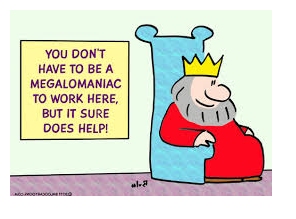Tiny Megalomaniacs
February 21, 2015
 Our national mythology leads us to believe in our own goodness. We have scriptures we turn to in moments of self-doubt, when our sense of righteousness needs stiffening. In them we find words such as, “We hold these truths to be self-evident…” or “…endowed by our creator…” or “Governments are instituted among Men, deriving their just powers from the consent of the governed…” These, among others, make us feel we’re special and so good and so exceptional —Americanly exceptional.
Our national mythology leads us to believe in our own goodness. We have scriptures we turn to in moments of self-doubt, when our sense of righteousness needs stiffening. In them we find words such as, “We hold these truths to be self-evident…” or “…endowed by our creator…” or “Governments are instituted among Men, deriving their just powers from the consent of the governed…” These, among others, make us feel we’re special and so good and so exceptional —Americanly exceptional.
But to be really exceptional, to be really good, we must take responsibility for everything and credit for nothing, otherwise we slide down a slippery slope at an accelerating clip until we’re taking credit for everything and responsibility for zip. True, this may be the manner of saints, but it’s something to strive for, if you get my gist.
Fortunately, some politicians tap into our national mythology for the sake of The Good and work to that end with humility, but too many others tap into it for the sake of power and wealth and work to that end with arrogance. Where the nation finally comes down depends upon many things, the foremost being the depth of our ignorance. We can’t have an effective democracy that works for a common good if a significant portion of us are stupid. This is exactly why we’re seeing a vicious, top-down assault on public education (and here –here) by politicians abetted by certain of the religious.
What happens on a personal level amplifies to national proportions by the effects of arrogant ignorance. It takes honest self appraisal to be what may rightly be called “good”. Otherwise it’s just a short slip down that aforementioned slippery slope unless (best case scenario) we acknowledge that we’ve already sloughed goodness many times like snake skin for the sake of some small gain, some little leverage, some edge, some in, elbowing out some less able contestant in Darwin’s world to gain what turns out to be a plot of worthless sand by means of tiny sins —which, of course, is only human.
The problem is that while the freedoms we tout in our mythology may have helped make us the richest nation on the planet, they have also blown a huge cocoonish bubble around us making it hard to be honestly self-reflective about what’s happening in the world and our responsibility for it. But, look, it’s tough, discernment’s not easy in the muddle of desire, everything we think we require is righteous so we turn to gods that fan that fire. We whisper prayers into corners first then, picking up a head of steam, we’re bellowing our righteousness from peaks as our minions mutter lies up and down mean streets and many bubbles burst.
One big bubble of recent years was burst by the events of 9/11. Look at what that bursting did to our sense of security, self esteem and honor: we started a war under false pretense spending billions and killing thousands of our own and others in the bargain, all out of an affront to our specialness and all done in the bliss of necessary nation-wide ignorance. Look at how that has fanned the flames of hatred by others as it exposed not only the self-interest of our motives in the Middle East (essentially oil) but the deep arrogance of our might. And notice how that has gotten us absolutely nowhere good. All this was done as we fanned the fires of national indignation and turned to the High Priests of gods that fanned that fire: The High Priests of politics, media and religion all stoking hate, while those of corporations were envisioning billions in blood.
But we can’t blame them entirely because ignorance starts here, on the ground, with us and our profound willingness to be duped, which brings us to the second big burst bubble. Think: the financial crash of 2008 which left us floundering in the lies of bankers, politicians and corporate talking heads —a crash that is certainly the fault of crooks in suits who, despite the depth of the debacle, have not personally paid for their crookedness— why? because we live in a land that honors megalomaniacs— why? because the other face of our national mythology is radiant with the hope and desire that we may, ourselves, become one —a tiny megalomaniac that is, at least.
Look, our fattest, most disgusting megalomaniacs did not become so in a vacuum, they became so as a result of human nature nurtured in and abetted by a cherry-picked mythology. We may not all reach the pinnacle of megalomania that our congress-people, presidents, bankers, and media personalities have. No— more often than not we don’t get that far. We settle for a provincial fiefdom running a big firm or corner bar, equally worthy jobs if our heart’s in the right place and we understand the limits of all and know we’re in this universe under an umbrella of chance, lucky to be small and know we have just a tiny part in the making of this curious dance.
Without that kernel of smallness, of humility, we’re all candidates for megalomania, tiny or otherwise. We’re all capable of heaping disaster and dishonor upon ourselves.
by Jim Culleny
2/21/15
Another Piece of Eternity
February 9, 2015
 Ask yourself this: is it possible to run out of time? I don’t mean personally and finally —although, even in that case we don’t really run out of time, it’s like time runs us out —kicks us out of its realm. “Bye, bye,” says Time, “you’re no longer relevant.”
Ask yourself this: is it possible to run out of time? I don’t mean personally and finally —although, even in that case we don’t really run out of time, it’s like time runs us out —kicks us out of its realm. “Bye, bye,” says Time, “you’re no longer relevant.”
No, what I mean is, is there an infinite amount of time or is there a finite amount that will eventually be depleted —say, a hundred billion years, just to pick a number. For instance, let’s say we add 30 seconds to anytime, what’s that interval? Hell, if we double it what’s that? Have we added to time?
What I’m driving at is, have you ever had a day that lasts three or one that goes so fast it’s past —instantly? Are those durations short or long, if hours mean anything? Bob Dylan once wrote, “Time passes slowly up here in the mountains.” I think those of a certain age know what he meant. Why does some time pass slowly and some fast? Is time elastic?
Going the other way, subtract 5 hours from anytime. Do we really think we’ve minced minutes? As we tick them off are they really not there? No. There’s a continuum called “now” outside of which is guesswork because our chronometers only work here. Slice it any way you want, it remains still and whole. Our clocks do not affect it.
These are important considerations because some people think eternity is elsewhere. They imagine some other timeless realm, which would be fine if such thinking didn’t diminish the significance of now and its imperatives and obscure the fact that eternity is now.
I’d argue that the eternity we should be paying attention to is the one we’re immersed in now —the now that changes. Yes, in fact, now is never what it was before because things change and will change again, now, not yesterday or tomorrow, it only happens now. Practically and personally speaking now is the only thing we have to work with. Now only knocks now. So the question is, should we be putting all our eggs in some other basket, or should we pay attention now?
Some great teachers advise just this. Yeshua bar Joseph advised, “Do not worry about tomorrow, tomorrow will worry about itself. Each day has enough trouble of its own.” This is really another way of saying that we should just forget about what happens after we die and pay attention to what’s happening now.
Or you may prefer something from a more contemporary guy, one who became expert in most of the world’s mythologies: Joseph Campbell. Campbell wrote, “When you realize that eternity is right here now, that it is within your possibility to experience the eternity of your own truth and being, then you grasp the following: That which you are was never born and will never die.” But, being as finite as we seem to be day to day, I admit that’s a tough nut to swallow, no matter how full of truth it might be.
And, finally, poet Emily Dickenson succinctly pointed out (in case we hadn’t noticed) that, “Forever is composed of nows.” Emily had a way of being concise and weighted with wisdom simultaneously.
The reason I bring now up now (when else could I do it?) is that there’s a lot of off-the-wall rhetoric flying around now that takes our mind off the certainly-now ball and focuses it on the maybe-then-for-eternity ball. In my humble opinion that’s just not a rational approach to the huge planetary problems we’re faced with now. Let any afterlife (any life after now) take care of itself (to paraphrase the wise Yeshua), right now there’s this life, the one we’re living now.
A few examples of irresponsible afterlife responsibility-displacement might help explain why now-thinking is important to those of us who place great importance on the present, while then-thinking is seriously problematic:
During the Reagan administration James Watt, a very religious man, and Reagan’s Secretary of the Interior (the Cabinet head charged with paying attention to the well-being of the environment) said, “We don’t have to protect the environment, the Second Coming is at hand.” Watt was of course talking about the second coming of the same Yeshua who specifically warned against this kind of thinking.
Then there’s this stunner: Ryan Dobson, son of the more famous James Dobson, again a very religious man said, “Kids today are looking for something to die for… If you give them something to die for, they’ll go to the edge of the earth for you,” —which is exactly the sort of philosophy we see creating terrorist hell worldwide: to die a warrior/martyr and be honored in an eternal afterlife. Maybe if such (again) very religious zealots were encouraged to live a good life in an eternal now, explosive vests would not be such alluring means of transport to an afterlife.
But afterlife philosophies have been around a long time and I doubt they will disappear soon, if ever, so for those of us who want to leverage as much goodness as possible in a very precarious world it might be wise to wake on each of the mornings of now and think…
……………………. here’s this day blaring like a fanfare
……………………. from a new horn crisp as frost on glass
…………………… its brink sharp as the edge of a blade
…………………… slicing off another piece of eternity
by Jim Culleny
2/9/15